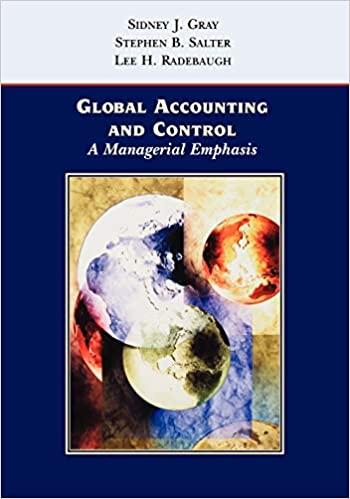Answered step by step
Verified Expert Solution
Question
1 Approved Answer
QUESTION Are the assumptions used in the cash flow forecasts in Exhibit 10 reasonable? Why or why not? The Offer for Media General's Newspaper Business



QUESTION
Are the assumptions used in the cash flow forecasts in Exhibit 10 reasonable? Why or why not?
The Offer for Media General's Newspaper Business Berkshire's offer consisted of two inseparable parts-an asset agreement and a credit agreement. Asset purchase agreement Berkshire was offering to acquire 63 daily and weekly newspapers and their real estate holdings for $142 million in cash. The deal excluded all pension and other benefit obligations for the papers as well as the Tampa Tribune, which had an asset value of $30 million according to an equity analyst.27,25 It also excluded any tax benefits from accumulated operating losses in the newspaper division. As a result, Berkshire would pay taxes on profits at the standard corporate rate of 35%. (Exhibit 10 shows cash flow forecasts for Media General's newspaper division, including the Tampa Tribune; Exhibit 11 presents current rate information.) Credit agreement Under a separate agreement, Berkshire would provide Media General with a $400 million term loan and a $45 million revolving credit facility. The term loan would have arn interest rate of 10.5% paid quarterly, an 11.5% discount to face value, thereby providing $354 million of cash to Media General; a maturity of eight years; and a security interest that was equal to the company's existing senior secured notes (the notes were rated CCC+ as of May 2012). The proceeds would be used to repay fully the company's bank loan.29 Berkshire would also receive "penny warrants" (warrants for Media General's shares exercisable within eight years at $0.01 per share) for 4.65 million Class A common shares, which represented 19.9% of Media General's common shares outstanding.30 Finally, Berkshire would have the option to nominate a director to Media General's board. The credit agreement would need to close within days to meet the May 25 deadline contained in the amended bridge loan agreement. Industry analysts reacted to the announcement immediately, yet with conflicting interpretations One analyst called the deal "a huge surprise."31 Another analyst wondered if Buffett was investing with his heart rather than his head because he had been a paper boy in his youth. She said, [S]ome of his motivations are not perfectly economic. He's the smartest investor of all time. But this is a non consensus investment that he's making right now."32 Others saw the deal more optimistically: "I don't think Berkshire Hathaway does anything where they're going to lose money," said one analyst.33 Another one said, "This is a feat of financial engineering more than about buying newspapers."54 In general, however, investors reacted positively: Media General's stock price jumped 33% from $3.14 to $4.18 on the day of the announcement on a day the market (S&P 500) was down 1.5% The Offer for Media General's Newspaper Business Berkshire's offer consisted of two inseparable parts-an asset agreement and a credit agreement. Asset purchase agreement Berkshire was offering to acquire 63 daily and weekly newspapers and their real estate holdings for $142 million in cash. The deal excluded all pension and other benefit obligations for the papers as well as the Tampa Tribune, which had an asset value of $30 million according to an equity analyst.27,25 It also excluded any tax benefits from accumulated operating losses in the newspaper division. As a result, Berkshire would pay taxes on profits at the standard corporate rate of 35%. (Exhibit 10 shows cash flow forecasts for Media General's newspaper division, including the Tampa Tribune; Exhibit 11 presents current rate information.) Credit agreement Under a separate agreement, Berkshire would provide Media General with a $400 million term loan and a $45 million revolving credit facility. The term loan would have arn interest rate of 10.5% paid quarterly, an 11.5% discount to face value, thereby providing $354 million of cash to Media General; a maturity of eight years; and a security interest that was equal to the company's existing senior secured notes (the notes were rated CCC+ as of May 2012). The proceeds would be used to repay fully the company's bank loan.29 Berkshire would also receive "penny warrants" (warrants for Media General's shares exercisable within eight years at $0.01 per share) for 4.65 million Class A common shares, which represented 19.9% of Media General's common shares outstanding.30 Finally, Berkshire would have the option to nominate a director to Media General's board. The credit agreement would need to close within days to meet the May 25 deadline contained in the amended bridge loan agreement. Industry analysts reacted to the announcement immediately, yet with conflicting interpretations One analyst called the deal "a huge surprise."31 Another analyst wondered if Buffett was investing with his heart rather than his head because he had been a paper boy in his youth. She said, [S]ome of his motivations are not perfectly economic. He's the smartest investor of all time. But this is a non consensus investment that he's making right now."32 Others saw the deal more optimistically: "I don't think Berkshire Hathaway does anything where they're going to lose money," said one analyst.33 Another one said, "This is a feat of financial engineering more than about buying newspapers."54 In general, however, investors reacted positively: Media General's stock price jumped 33% from $3.14 to $4.18 on the day of the announcement on a day the market (S&P 500) was down 1.5%Step by Step Solution
There are 3 Steps involved in it
Step: 1

Get Instant Access to Expert-Tailored Solutions
See step-by-step solutions with expert insights and AI powered tools for academic success
Step: 2

Step: 3

Ace Your Homework with AI
Get the answers you need in no time with our AI-driven, step-by-step assistance
Get Started


